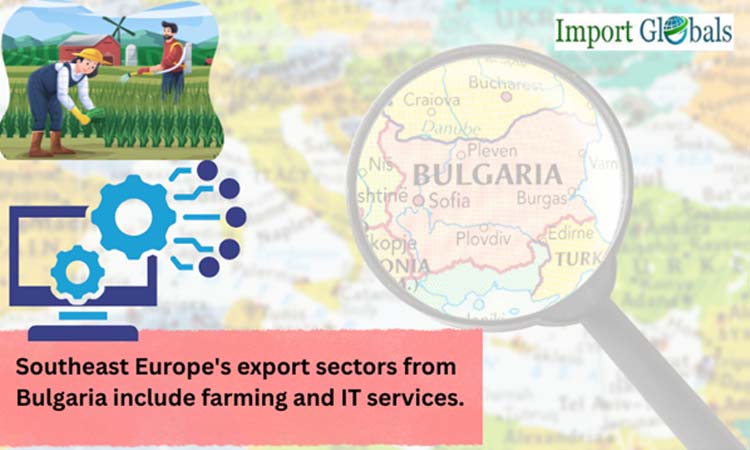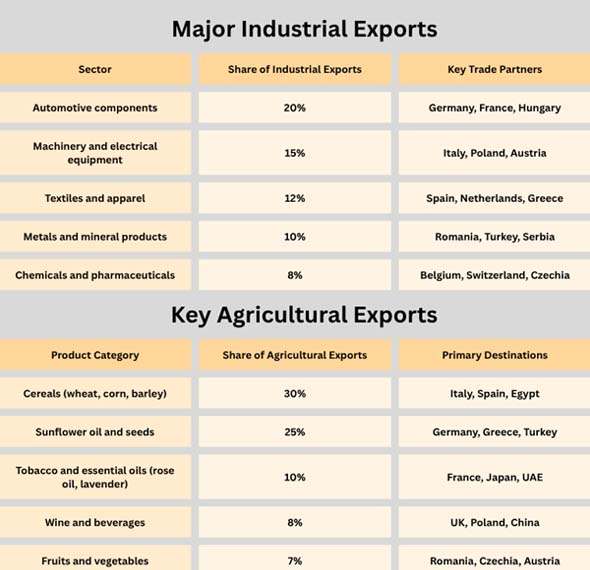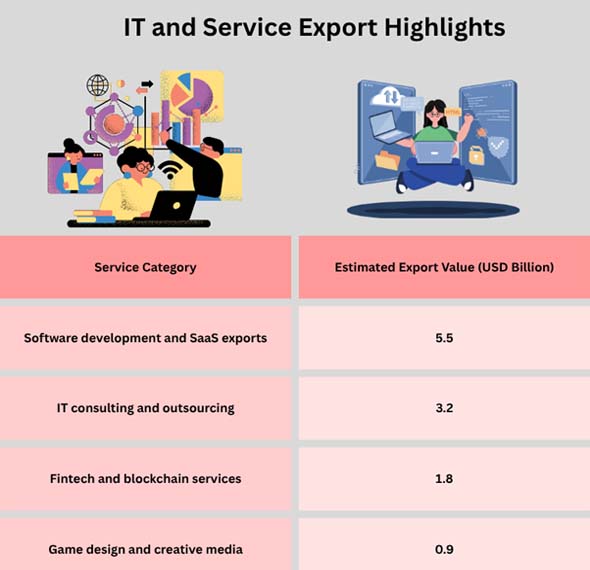
- Nov 06, 2025
Southeast Europe's Export Sectors From Bulgaria Include Farming and It Services
As per Bulgaria import data by Import Globals, Bulgaria is in a great spot between Europe and Asia, and over time its exports have changed from traditional agricultural goods to a wide range of services and industries. The country was mostly known for exporting rose oil, wine, and grain. Now, it's a place where people make electronics, write software, and use computers.
As per Bulgaria Import Export Trade Data by Import Globals, Bulgaria has been a member of the EU since 2007. It has established a balanced export economy by using access to the single market, foreign investment, and a trained workforce. This country in Southeast Europe shows how a small economy can compete on the world stage by being flexible, cheap, and creative in fields like farming and IT.
Bulgaria's Trade and Economy: A Look
More than 70% of Bulgaria's GDP comes from exports, making its economy one of the most open in Southeast Europe. In the last ten years, trade in both products and digital services has grown. This is due of changes that are still going on, more productivity in the manufacturing sector, and joining the EU.
As per Bulgaria Export Data by Import Globals, Exports from the country are slowly but steadily moving away from resource-based industries and toward knowledge-based ones. The country is a member of the EU, and technology has evolved all over the world.
Agriculture is Bulgaria's most Important Export Business
As per Bulgaria Import Custom Data by Import Globals, agriculture is still an important element of Bulgaria's trade, both for business and for culture. The country has fertile plains, a good climate, and easy access to the Danube and Black Sea. This means it can grow a lot of different things to sell.
Bulgaria is one of the EU's top producers of sunflower oil, and its rose oil sector sells to perfume stores all over the world. But there are problems in the agriculture business, such an aging workforce, climate change, and prices that change all around the world.
The government is changing the way agricultural exports migrate from raw materials to branded goods by focusing on value-added agro-processing, such as organic foods, bottled oils, and specialty drinks.
Exports of Manufacturing and Industry
Bulgaria's exports have grown mostly because of manufacturing, which makes up almost half of all exports. As per Bulgaria Import Trade Analysis by Import Globals, Electronics, textiles, machinery, and car parts are all part of the country's industrial environment.
Bulgaria's automotive supply chain has grown since it is close to Central Europe and has cheap production costs. Sensata, Yazaki, and Festo are some of the main companies that make parts for automotive electronics and mechanical systems in huge factories all over the world.
As per Bulgaria Exporter Data by Import Globals, EU money has helped the electronics and manufacturing industries move quickly to higher-value products instead of cheap parts.

The Growth of IT and Digital Services
As per Bulgaria Importer Data by Import Globals, Bulgaria has been a leader in outsourcing IT labor and shipping software to other nations in the previous ten years. People nickname it "The Silicon Valley of the Balkans" because of this. There are a lot of young, bilingual people that work here, and the cost of labor is inexpensive. The technical education system is also very good.
More than 7% of Bulgaria's GDP comes from the IT industry, and the country's exports are increasingly focused on cloud computing, cybersecurity, finance, and business solutions. The presence of huge firms like SAP, VMware, and Hewlett-Packard in the country, along with the growth of startups in Sofia, Plovdiv, and Varna, shows that the country is getting stronger at technology.

Minerals and Energy that are Sent Outside
As per Bulgaria Import Trade Statistics by Import Globals, Bulgaria still has enough natural resources to export energy and mining, mostly copper, zinc, and coal. But the government is slowly becoming ready to market renewable energy, principally solar panels and power from the Balkan system.
New ideas and trends in Trade
Bulgaria's exports fluctuate as commerce in Europe as a whole evolves.
Trends that will have a huge effect on the Future:
As per Bulgaria Import Data by Import Globals, Digitalization is the use of AI and automation together in manufacturing and logistics.
Green Exports: things created from more eco-friendly materials, bio-agriculture, and energy that can be used again and again.
Regional Integration: As per Bulgaria Export Data by Import Globals, the EU's TEN-T (Trans-European Transport Network) corridors made trade stronger.
E-commerce is helping small and medium-sized businesses (SMEs) grow by connecting them to global value chains.
As per Bulgaria Import Export Trade Analysis by Import Globals, There are many things that make Bulgaria a good place for these changes to happen. For instance, it offers low taxes, is close to big EU markets, and the government gives tax breaks for exports that are based on novel ideas.
Investors and exporters can find Chances
Bulgaria's open economy and strategic location in Southeast Europe make it possible for a number of industries to grow:
1. Food and things that have been Changed
Exporters and investors can work together on things like getting items where they need to go, organic farming, and food processing. People in the EU want more and more things that are bio-certified and can be traced.
2. Working together in the Automotive and Industrial Industries
Bulgaria's industrial zones, trained workers, and easy access to EU markets for trade are all things that foreign investors prefer. Some of the most important things to work on include parts for electric automobiles, sensors, and machines that are very accurate.
3. Hiring outside companies to do IT work and building up centers for new Ideas
Bulgaria's innovation ecosystem is open to collaborate with people from other countries on AI, data analysis, and cybersecurity. As per Bulgaria Export Import Global Trade Data by Import Globals, it's fantastic for research and development facilities because it's cheap to run and a lot of individuals there can speak more than one language.
Issues with Boosting Exports
Bulgaria has solid fundamentals, but it also has certain structural flaws that could make it less competitive when it comes to exports:
We need to fix our ancient roads and trains.
People are leaving the country because there aren't enough skilled workers.
Energy Dependence: We need to invest in renewable energy so that we can slowly quit using coal.
Bureaucracy and Administrative Burden: Regulatory processes are getting better, but they can still make it harder to export.
For the next ten years, greater money from the EU and better technology should help with many of these problems.
What will happen between 2025 and 2035?
The country's exports are expected to keep rising up steadily as it goes digital and diversifies its businesses.
The country's long-term trading potential depends on finding a balance between its old strengths in agriculture and industry and its new capabilities in IT and renewable energy.
In conclusion,
Bulgaria's exports have changed over time, shifting from farmland to lines of code. This is a great example of how the economy of Southeast Europe is getting better overall. The country has effectively expanded its trading base and become a competitive exporter in the EU and beyond by combining its agricultural legacy, industrial capacity, and digital innovation.
For the next ten years, Bulgaria's economy will be molded by its two roles as an agricultural producer and an IT hub. This will happen when the country keeps getting foreign investment and expanding its technology base. Bulgaria is a trade partner that is open to change and focused on long-term growth. This makes it a good choice for exporters, investors, and global partners who want to do business in Southeast Europe. Import Globals is a leading data provider of Bulgaria Import Export Trade Data.
FAQs
Que. What are the main industries in Bulgaria that send goods to other countries?
Ans. Agriculture, car parts, electronics, IT services, and industrial machinery are the key industries that send commodities to other countries.
Que. Why is Bulgaria an excellent place to send digital goods?
Ans. The IT industry has risen quickly because it has skilled workers, low business expenses, and a solid technical education system.
Que. What changes are happening in Bulgaria's farming business?
Ans. It is transitioning away from sending raw commodities to other countries and toward sending things that are worth more, including refined oils and organic food.
Que. What chances do investors from other nations have?
Ans. Some important industries are making cars, employing renewable energy, hiring IT workers from other countries, and processing food.
Que. Where can you obtain detailed Bulgaria Import Export Global Data?
Ans. Visit www.importglobals.com or email info@importglobals.com for more information on up-to-date data.
